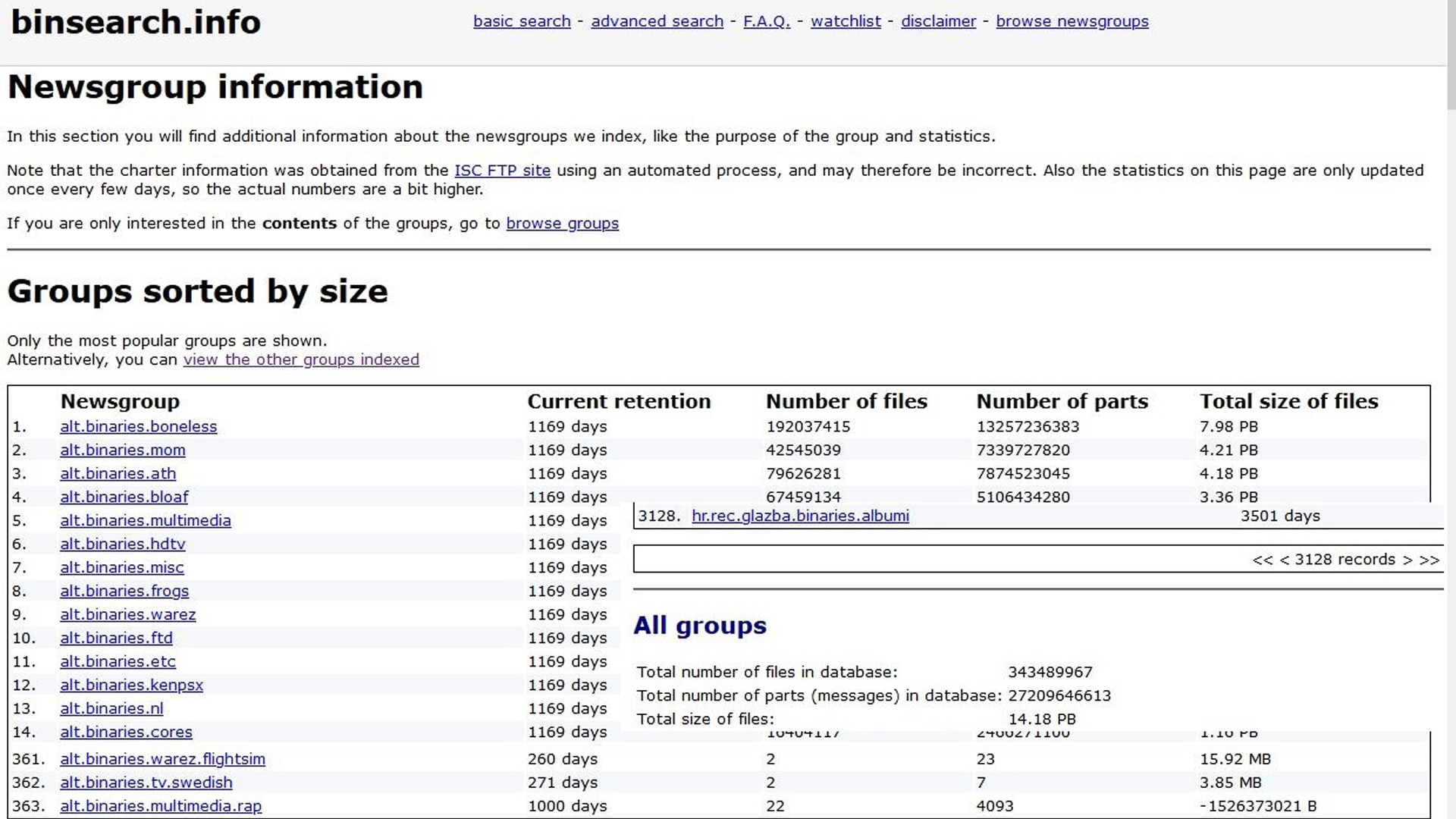The Big 8 Usenet newsgroup hierarchies and what they cover
There are a series of Usenet newsgroups preserved for access via newsreaders, and we outlined these main groups and what they cover


Newsgroups are specialised discussion forums that are part of an old internet technology known as Usenet.
Originally developed more than 40 years ago, Usenet is still operating today, accessed via the best Usenet providers and providing dedicated Usenet newsgroup forums via the best newsgroup readers. These allow people to share files and take part in conversations.
Usenet provides several advantages for users including anonymity, rapid file sharing, group communications, long file retention times, and a clear organisational structure for newsgroups. Due to the sheer amount of information posted on Usenet, newsgroups are themed around certain areas, based on a “hierarchy” of topics.
We’ll explore each of the eight main hierarchies of newsgroups on Usenet, and explain what type of content you might find in each one. You’ll have a good starting point for researching particular areas of internet culture, participating in threaded conversations, and downloading files based on your topics of interest.
The Usenet newsgroup hierarchy structure and naming conventions
Usenet newsgroups are based on a “hierarchical” organisation—grouping newsgroups together into common themes and then subdividing those areas into smaller and smaller niches and subcategories. At the top of the hierarchy, you have the “Big Eight” main structure. All newsgroups either fall into one of these eight master categories, or a ninth, unofficial category known as “Alt.”
Every newsgroup has a distinct name, which explains where it is in the Usenet hierarchy. It’s helpful to illustrate this with an example. There’s a newsgroup dedicated to sharing jazz music called:
alt.binaries.sounds.mp3.jazz
Get the ITPro daily newsletter
Sign up today and you will receive a free copy of our Future Focus 2025 report - the leading guidance on AI, cybersecurity and other IT challenges as per 700+ senior executives
Let’s break that down:
- The first part of the name, “alt”, means this is a newsgroup in the “Alt” master category
- The second part, “binaries”, defines this newsgroup as specifically for sharing files
- The third part, “sounds”, shows you can expect to find audio files here
- The fourth part, “mp3”, lists the file format
- The final part, “jazz”, indicates the MP3 audio files are for the jazz genre
All newsgroups follow similar naming conventions. For example:
- rec.sport.baseball.redsox would be discussions on the Boston baseball team
- comp.graphics.apps.photoshop provides information and conversations for the popular Adobe software
- sci.astro is for conversations on astronomy
Generally, the more sections of the newsgroup name (separated by periods), the more niche the subject matter. Users can refer to collections of newsgroups using the “*” wildcard character. For example, if you wanted to describe all newsgroups that fall under American political discussion, you might reference: talk.politics.us.*
An overview of the Big Eight newsgroup hierarchies

The “Big Eight” newsgroup hierarchies are defined and managed by the Big 8 Management Board. The mission of this management board is to:
- Create well-named, well-used newsgroups in the Big 8 Usenet hierarchies
- Make necessary adjustments to existing groups
- Remove groups that are not well-used
- Assist and encourage the support of a canonical Big 8 newsgroup list by Usenet sites
The name “Big Eight” is a slight misnomer, as a newsgroup can actually belong to one of nine main areas—eight “official” categories and a ninth, unofficial grouping known as “Alt.” The eight official categories are:
- Comp: information on computer science, coding, development, engineering, and similar topics
- Humanities: files and discussions for literature, music, art, and similar topics
- News: discussion about Usenet itself, although this has widened to more general news topics
- Rec: conversations about games, hobbies, crafts, and other recreational activities
- Sci: topics including physics, chemistry, biology, and some other STEM subjects
- Soc: socialising, general chat, and discussion of social subjects
- Misc: miscellaneous topics that don’t fit into one of the other main hierarchies
- Talk: discussion of controversial subjects like politics or religion
The ninth category, “Alt,” covers topics that don’t fit into any of the other eight main areas. As the name suggests, “Alt” is home to a diverse range of newsgroups covering many different niche interests. The “Alt” grouping is outside the control of the management board.
Country, language, and regional newsgroup hierarchies
Newsgroups can also belong to one of several country, language, or regional hierarchies. Examples of these categories include:
- aus.*: Australian newsgroups
- ba.*: discussions for the San Francisco Bay area
- ca.*: conversations about California
- can.*: Canadian newsgroups
- cn.*: Chinese newsgroups
- chi.*: discussions about the Chicago area
- de.*: discussions in German
- ec.*: discussions about Ecuadorian culture and society
- fr.*: discussions in French
- fj.*: discussions in Japanese
- hawaii.*: discussions local to Hawaii
- hk.*: Hong Kong newsgroups
- it.*: discussions in Italian
- nl.*: Dutch newsgroups
- no.*: Norwegian newsgroups
- pl.*: Polish newsgroups
- uk.*: discussions on matters in the United Kingdom
Other Usenet newsgroup hierarchies
In addition to “Alt,” other top-level hierarchies include:
- biz: business-related topics and discussions
- bionet: covering biology-related content
- k12: resources for K12 educations
- microsoft: discussion of Microsoft products
Newsgroups dedicated to uploading, downloading, and sharing files

Usenet newsgroups make it easy to upload, download, and share files. These files include images, music, movies, games, videos, and many types of multimedia and other content. Although users can upload and download files to most newsgroups, there are some newsgroups dedicated only to sharing digital files. You can identify these through the word “binaries” in the newsgroup name.
Binary files are often subject to “retention limits”, which define how long the file will be available after its uploaded. Retention times do vary between Usenet providers. Some users even take advantage of newsgroups to host data backups. Usenet can be a helpful source of user-created works, open-source software, and public domain material.
If you’re interested in newsgroup files, you can use dedicated newsgroup reader software applications designed specifically to search for and download files. Our round-up of the best Usenet readers covers two of the most popular binary-only applications, SABnzbd and NZBGet.
If you decide to download binary files from Usenet newsgroups, be aware of the following:
- Some of the files uploaded to Usenet newsgroups may be hacked, pirated, or otherwise compromised: this is particularly common on newsgroups with “warez” in the name, although you may find such files posted across many binaries newsgroups
- Always ensure that you will not be in breach of any laws, policies, copyrights, EULAs, or similar restrictions through uploading, downloading, installing, using, or interacting with any files
- Uploaded files may contain malware: always check files carefully for viruses, trojans, or other malicious payloads
The website binsearch.info allows users to view how many files are uploaded to alt.binaries.* newsgroups. This equates to more than 40 petabytes of data and more than 1.1 billion files over the last two years.
If you want to download content from Usenet, then you’ll want to prioritise unlimited connection speeds and bandwidth when choosing a Usenet provider. A number of providers offer unlimited bandwidth for downloads, including Newsleecher, Newsgroup Ninja, and GigaNews.
Creating and removing newsgroups within the Big Eight hierarchy
Although there are a vast number of existing Usenet newsgroups, anyone can request the formation or deletion of a newsgroup. The Big 8 Management Board uses a formal process for requesting newsgroup creation, and another for deletion.
Newsgroups may also be moderated, requiring moderator pre-approval of posts prior to release into the newsgroup, or unmoderated, which allows all posts. Moderated newsgroups often have “.moderated” appended to the end of the group name.
“Alt” newsgroups are not under the purview of the management board, and do not follow these policies.
How to access Usenet newsgroups across all hierarchies
If you want to search and interact with newsgroups, then you will need specialist software and access. You can’t access Usenet through a standard web browser—instead, you’ll need both a Usenet newsgroup reader and a Usenet provider.
- Usenet newsgroup readers are the software applications you can use to access content on the Usenet network
- Usenet newsgroup providers are the services that provide that network access
You need both of these to access newsgroup content. We’ve researched the readers and providers and can recommend the right technology for you to explore newsgroup hierarchies:
- The best Usenet newsgroup readers outlines our guide to the software you can use to access, read, post to, and download from newsgroups
- The best Usenet providers explores low-cost ways for you to access Usenet through dedicated services
Explore your favourite Usenet newsgroups
Once you have a newsgroup reader and a Usenet provider, it’s time to explore. Fortunately, the strict ordering of many newsgroups within these hierarchies, and fully-featured newsgroup reader software, makes this fast and easy. Enjoy!
Further reading on Usenet
Learn how to download from Usenet, if you're interested in downloading files from the platform. It's also worth learning about Google Groups, another modern method for accessing Usenet; and take a look at our other reviews of top Usenet providers, including Eweka, EasyNews, UsenetServer, and Giganews.
Paul is a highly experienced professional writer who creates extensively researched, expert, in-depth guides across business, finance, and technology.
Boasting over 20 years of business experience working across large corporations, Paul started his own business in 2006. This gives him a unique, first-hand understanding of the challenges businesses and entrepreneurs face.
Paul loves the challenge of taking complex subjects and breaking them down so they are easily understood. He specializes in creating content spanning a variety of formats, including website copy, blogs, knowledge bases, white papers, support guides, tutorials, and in-depth articles.
-
 Bigger salaries, more burnout: Is the CISO role in crisis?
Bigger salaries, more burnout: Is the CISO role in crisis?In-depth CISOs are more stressed than ever before – but why is this and what can be done?
By Kate O'Flaherty Published
-
 Cheap cyber crime kits can be bought on the dark web for less than $25
Cheap cyber crime kits can be bought on the dark web for less than $25News Research from NordVPN shows phishing kits are now widely available on the dark web and via messaging apps like Telegram, and are often selling for less than $25.
By Emma Woollacott Published